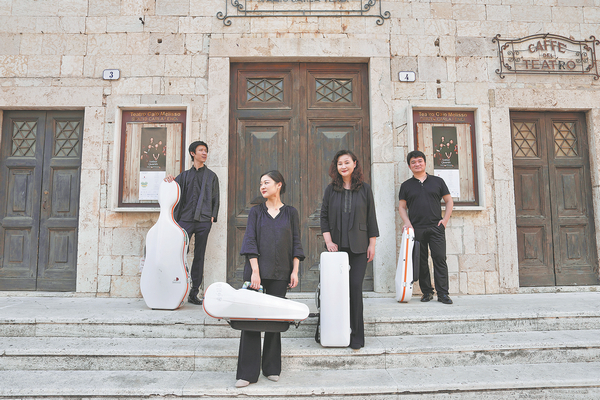Listening to the Amber Quartet is to witness the convergence of two musical worlds, where the resonance of ancient Chinese traditions meets the refined legacy of Western classical music.
Since its founding in 2005, the Beijing-based string quartet has consistently pushed boundaries, making its mark both on domestic and international stages.
The quartet performed on July 4 at Italy's prestigious Spoleto Festival, one of the country's longest-standing cultural events. The concert formed part of the ensemble's 20th anniversary celebration and powerfully showcased its unique ability to bridge cultures through music.
The program combined classical Western works with contemporary Chinese compositions, and unfolded into a compelling narrative of cross-cultural dialogue.
The evening opened with Puccini's Crisantemi, a work suffused with haunting melancholy. The Amber Quartet's lush, expressive interpretation found a poignant counterpart in Wang Liping's Buried Flowers, drawn from his score for the 1987 Chinese television adaptation of Dream of the Red Chamber, the classic Qing Dynasty (1644-1911) novel. Both pieces explore themes of loss and introspection — one through the lens of Italian elegy; the other steeped in Chinese sentiment.
"We wanted to create a musical dialogue by pairing these two pieces, blending the solemnity of Puccini's lament with distinct Chinese sensibility," says cellist and cofounder Yang Yichen.
The dialogue continued with Totem by contemporary Chinese composer Zhang Zhao, whose music draws on the folk melodies of his native Yunnan province, followed by Debussy's String Quartet in G Minor, a cornerstone of the Western chamber repertoire.

The Amber Quartet presents a harmonious musical fusion at Italy's prestigious Spoleto Festival.[Photo/China Daily]
While Debussy's impressionistic textures evoke the subtleties of light and nature, Zhang's Totem paints a vivid soundscape of China's rural landscapes with a deeply personal voice. The pairing felt less like contrast and more like reflection — each work illuminating the other.
Throughout the performance, the Amber Quartet embodied the spirit of cultural fusion. The members' deep roots in both traditions lent the concert not only technical brilliance but also emotional resonance. It became more than a recital; it was a statement about music's power as a universal language.
"When the audience erupted in applause, we felt proud that we had succeeded in building a vibrant bridge between cultures through music," Yang says.
Monique Veaute, artistic director of the Spoleto Festival, first encountered the quartet during a visit to China and was deeply impressed by their artistry. It was fitting that they performed at Spoleto, a festival founded in 1958 by composer Gian Carlo Menotti, with the aim of fostering a dialogue between the East and the West — an idea reflected in its original name, Festival dei Due Mondi (Festival of Two Worlds).
Each summer, the picturesque town of Spoleto, with its ancient architecture and sweeping vistas, becomes a global stage for the arts.
The ensemble consists of first violinist Ning Fangliang, second violinist Su Yajing, violist Qi Wang and cellist Yang, all faculty members at the Central Conservatory of Music in Beijing.
In 2013, the quartet achieved a milestone by winning three awards at the Asia-Pacific Chamber Music Competition in Melbourne. It was the first time a Chinese quartet had won the competition.
Two decades on, the quartet continues to redefine what it means to perform across cultures — not by fusing traditions into sameness, but by allowing each voice to sing in harmony and contrast, creating something wholly new.
 Editor:Qiu Xiaochen
Editor:Qiu Xiaochen